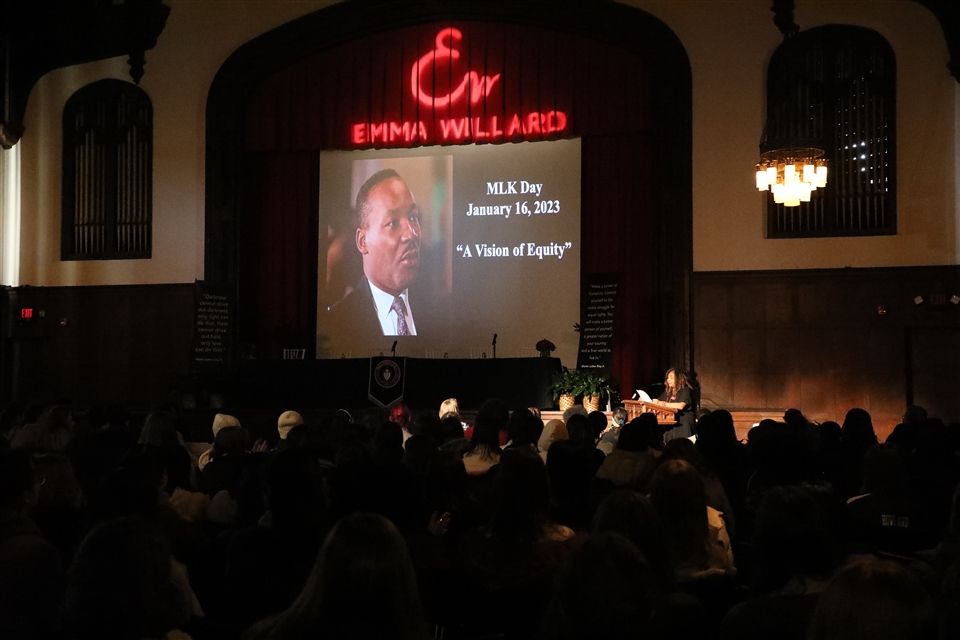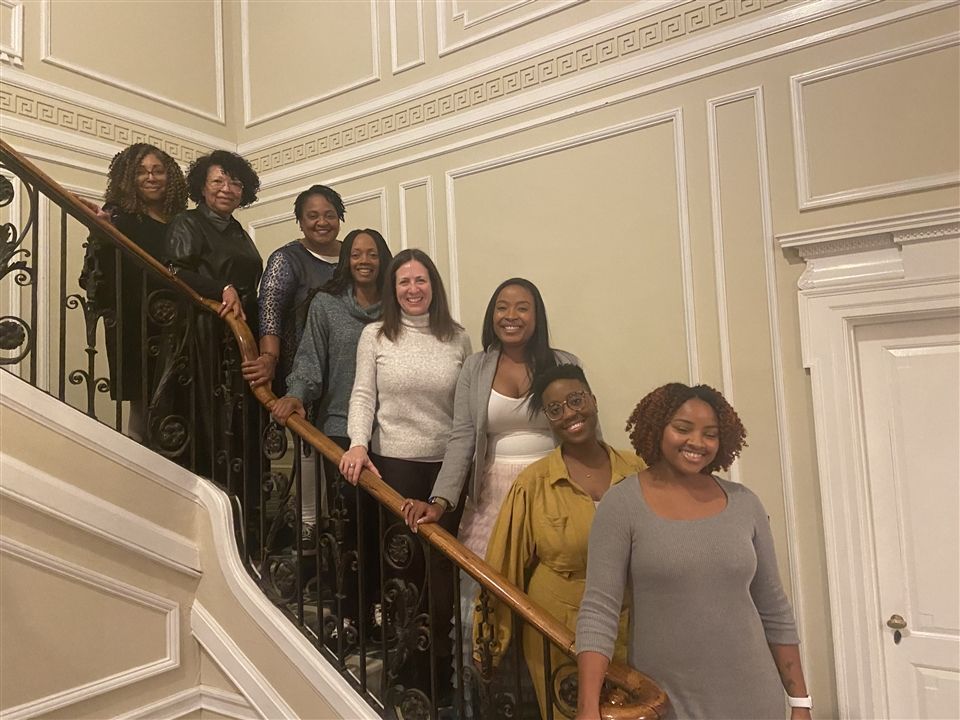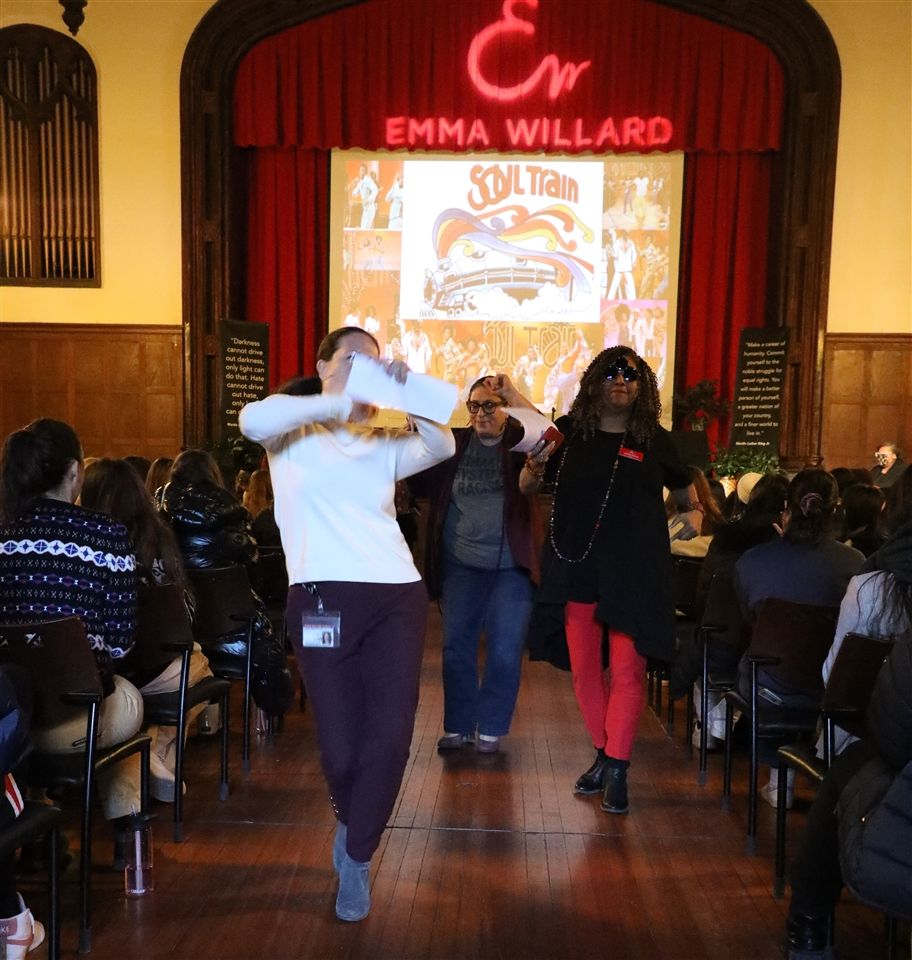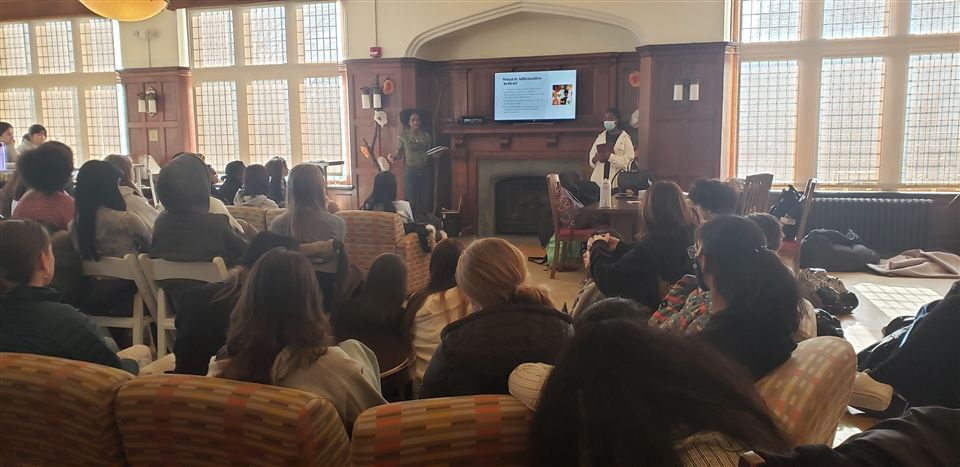A Vision of Equity: MLK Day 2023
1/18/2023
Communications
Each year on Martin Luther King Jr. Day, the Emma Willard School community gathers for special programming to honor his legacy. This year’s theme, “A Vision of Equity,” explored both Dr. King’s dream of equity for all, as well as the equity work that has been done and is still to come in a variety of intersecting areas.
MLK Day 2023 opened with a video of students from P.S. 316 Elijah G. Stroud Elementary in Brooklyn singing “Lift Every Voice and Sing,” considered to be the Black national anthem, written as a poem by NAACP leader James Weldon Johnson in 1900. Head of Equity and Inclusion Christine Gilmore launched the day reflecting on Johnson’s solemn but hopeful appeal for the liberty of Black Americans. The song was used as a rallying cry of the Civil Rights Movement of the 1950s and 60s, when the world was introduced to Dr. Martin Luther King Jr.
ALUM PANEL
A distinguished panel of Emma Willard School alums spanning six decades—attorney Amanda G. Benjamin-Smith ’99, TV editor Teki Cruikshank ’88, recent Georgia graduate Lauryn Harris ’17, physician Dr. Barbara Nabrit-Stephens ’68, educator and DEI practitioner Pamela Thomas ’76, and copywriter Ari Thompson ’08—shared their reflections, wisdom, and lived experience. Students Angie A. ’24, Vivian C. ’24, and Anyla L. ’25 moderated the discussion, with questions centered around each panelists’ experience navigating life as a Black woman from their earliest days at Emma Willard School and beyond into their chosen careers. (Read bios of each alum in the day’s program.)
Dr. Nabrit-Stephens, who was actually a student at Emma Willard when Dr. King was assassinated, shared her recollection of the time and what she learned from it: “When Dr. King was assassinated, I had been home in Memphis. But things were so hot in Memphis that my parents had sent me to my aunt’s house in New York to spend the rest of our Spring Break with her before it was time to come back here. Things were so, so tense in Memphis. I can’t say that I was surprised that he was assassinated because messaging was coming out all the time to Black individuals in the community saying, ‘Get him out of town; he’s going to be killed.’ But it was still a devastating shock that they carried out what they said they were going to do. One of the things I carry forward from that…if a leopard is a leopard, believe it’s a leopard. When you hear people say they’re going to do something, believe it. We must do what we can do to stop it.”
Ms. Thomas, whose time at Emma immediately followed the Civil Rights era, recalled that her life was not substantively different at the time: “The uncertainty, the challenges, the obstacles have always been present in my life. We have always had things we were up against—issues Black people faced just being Black in this country. It was my life and my truth and my reality, but I remained optimistic. I’ve never let myself not do things because of challenges. That’s part of what I learned here. I’m optimistic because you are coming up with ideas and ways to resolve the problems in this country and in the world. I believe that you all represent new ways of doing things. We can’t move forward doing the same things we’ve always done. Be a part of the solution.”
The panelists shared words of advice specific to the high school experience: Don’t be discouraged by people who aren’t supportive of you; there are people who are on your side and who do want what you have to offer. Stop worrying about what people think about you and start figuring out what makes you tick. Be confident in your identity. Have compassion for yourself and take care how you speak to yourself. Life is a journey; enjoy the ride. All of your interactions contribute to the person you become. Don’t let anyone tell you that you can’t do something. Find your source of resilience and build on it.
“Emma alums and Emma students never cease to impress and inspire me,” shared Head of School Jenny Rao. “I am particularly touched that these six incredible alums set aside time in their week for love for their school and most importantly, as was evident in their remarks, their love for you, our students. They want to make sure that their life stories, that their shoulders are shoulders you stand on as you build your next chapter.”
Before heading out for the rest of the day's activities, Theatre Instructor Faith Lawson led the community in a Soul Train exiting Kiggins Hall.
Before heading out for the rest of the day's activities, Theatre Instructor Faith Lawson led the community in a Soul Train exiting Kiggins Hall.
WORKSHOP SESSIONS
Following an inspiring opening session, the Emma Willard community headed to a series of workshops presented by students and employees on a variety of equity-centered themes. From environmental justice to affirmative action to antisemitism, presenters encouraged their audiences to consider the vast impact of equity across intersecting identities. Throughout the day, Dr. Martin Luther King Jr.’s speeches were playing continuously in the Admissions Suite, allowing anyone to stop in and listen firsthand to his powerful messages.
A glimpse into the full programming for the day illustrates the intersectionality of equity work:
-
Affirmative Action Legislation presented by Liz Q ’24 and Zaniyah A. ’24
-
Racism in Artificial Intelligence Algorithms presented by Mathematics and Computer Science Instructor Chiara Shah
-
History of Sex Ed & Its Ties to White Supremacy presented by Director of READY Programs Evangeline Delgado
-
Antisemitism in Modern Media presented by Bea C. ’23
-
Songs and Poems of the Civil Rights Movement presented by Head of Enrollment Kristen A. Mariotti
-
Blackness in Film and Media presented by Yuri O. ’25
-
Maternal Mortality in Black Women presented by Gabby P. ’23
-
MLK’s Poor People’s Campaign presented by Coach Eric Lundblade (previously history department chair at Hebron Academy)
-
Going Beyond Land Acknowledgement presented by Associate Director of Equity and Inclusion Gemma Halfi
-
Heritage, Identity, and Leadership presented by Head of School Jenny Rao, Soumya B. ’23, Astrid O. ’24, Aishah R. ’23, and Maryam S. ’24
-
Environmental Racism presented by History Instructor Dr. Katharine Holt
-
BIPOC Buddhists and the Embodiment of Social Justice presented by English Instructor Aidan Bardos
Harkening back to the very origins of inequity in the United States, Associate Director of Equity and Inclusion Gemma Halfi delved into the importance of understanding the history of first nations. She presented videos on related themes: correctly addressing members of a Native Nations, developing a personal action plan to aid indigenous efforts, and an exploration of how treaties have been used to marginalize America’s first human inhabitants. Ms. Halfi helped connect the workshop’s learnings to Martin Luther King Jr.’s own commitment to Native Americans, noting the involvement of many first nation representatives at the famous March on Washington for Jobs and Freedom and the way the NAACP provided a framework for the Native American Rights Fund to successfully operationalize their own organizations.
Exploring the Civil Rights Movement itself, Kristen Mariotti highlighted the music of the era, which took inspiration from African American spirituals, gospel, and folk music. The music served to motivate them through long marches, provide psychological strength against harassment and brutality, and sometimes to simply pass the time when waiting for something to happen. Eric Lundblade explored the origins and intentions of nonviolent civil disobedience. He explained the timing of the Civil Rights Movement, President Lyndon B. Johnson’s War on Poverty, the Vietnam War, the Watts Riots, and ultimately the Poor People’s Campaign, which came to fruition after Dr. King’s death.
In their presentation on Affirmative Action, Liz Q. ’24 and Zaniyah A. ’24 presented a history of the legislation, explaining the origins of the legal structure meant to reduce unlawful discrimination and promote equitable hiring and educational practices. They explored Supreme Court cases that have repeatedly challenged the legislation, even as recently as the current case of Students for Fair Admissions vs. Harvard University, set to be decided in June 2023. Liz and Zaniyah explained the benefits of Affirmative Action, the arguments against it, and suggested ways that we can continue the work even if the Supreme Court reverses the legislation. “If we lose Affirmative Action,” they explained, “we can all continue to do the work on our own. Not because it’s mandated, but because we care.”
Highlighting the way media impacts their own lived experiences, Yuri O. ’25 and Bea C. ’23 explored the portrayal of Black and Jewish identities. In “Blackness in Film and Media,” Yuri showed the evolution of the black experience in Hollywood and beyond. While representation on both ends of the camera has slowly improved, there is still an uneven balance and colorism is forcing actors with deeper skin tones out in favor of those with lighter skin, reinforcing harmful standards of beauty that are echoed across the globe. Bea’s presentation raised awareness about the persistence of antisemitism in modern media. The subtle practice of “Jew-coding” can be readily seen—that is, when characters in literature, movies, television, and other media are not explicitly stated as Jewish but possess enough stereotypically Jewish characteristics to be subconsciously read as Jewish. These characters are often placed in a negative light, whether overtly or subtly.
Gabby P. ’23, who has presented for the past three years, has focused on highlighting a variety of issues related to the Black experience in her workshops. “I was always motivated to present because I believed that each issue should be talked about by others,” Gabby shares. “I felt that my classmates should be aware of how much these issues affect Black people and should find their own way to speak up about them when possible.” This year her presentation on “Maternal Mortality in Black Women” explored research revealing the realities that Black, American Indian, and Alaska Native (AIAN) women have higher rates of pregnancy-related death compared to white women. Gabby adds, “I enjoy hearing what people have learned. Seeing them share that knowledge with others and being ready to use their voice for change gives me hope for the future.”
Head of School Jenny Rao, Soumya B. ’23, Astrid O. ’24, Aishah R. ’23, and Maryam S. ’24 led a full crowd through a moving exploration of leadership across cultural identity. Representing the United States, Mexico, Afghanistan, Morocco, and Honduras, the panelists captivated their audience by sharing stories of home, the people who shaped their upbringings, and how their respective environments have defined their picture of leadership. While our panelists were different in a geographical and cultural sense, they all shared a deep appreciation for the meaningful opportunities they have found at Emma Willard School. They shared a reminder to the audience not to take their time at Emma for granted. Access to high quality education, teachers who broaden our perspectives, and friendships that fill us with love and appreciation do not come every day. Like Dr. Martin Luther King Jr., our panel of diverse leaders inspire us to see the bigger picture, no matter how hard the journey has been, and hold the light in each day.
NEXT STEPS
As we continue to honor the legacy of Dr. King, the Emma Willard community now embarks on a 21-day Equity Challenge, exploring content curated by our Office of Equity and Inclusion. Each day for the next 21 days, students, employees, parents, and alums will receive content that will inspire and challenge their thinking around issues of equity and belonging.
---
To see more photos from the day, visit our SmugMug.
---
To see more photos from the day, visit our SmugMug.

Head of Equity and Inclusion Christine Gilmore launches MLK Day activities at Emma Willard School

Alum panelists gather in Wellington-Lay for conversation and connection prior to the big day. From top to bottom: Christine Gilmore, Dr. Barbara Nabrit-Stephens ’68, Pamela Thomas ’76, Teki Cruikshank ’88, Head of School Jenny Rao, Amanda G. Benjamin-Smith ’99, Ari Thompson ’08, and Lauryn Harris ’17

Head of School Jenny Rao, Associate Director of Equity and Inclusion Gemma Halfi, and Head of Equity and Inclusion Christine Gilmore lead the Soul Train, dancing their way to the rest of MLK Day activities

Liz Q. ’24 and Zaniyah A. ’24 present on Affirmative Action














